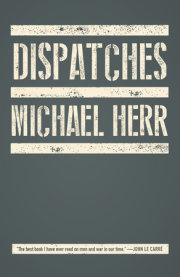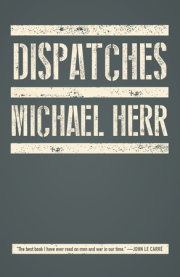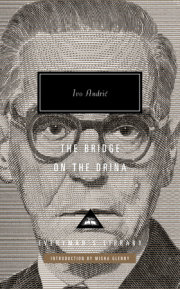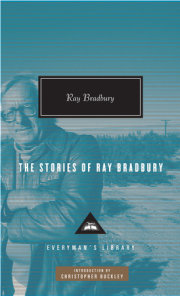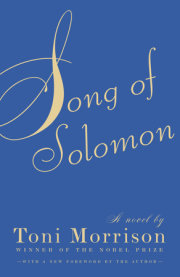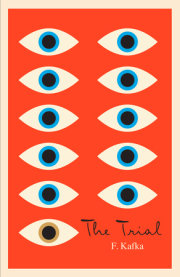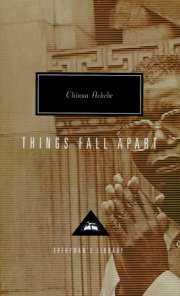INTRODUCTION
In 1971, during the rainy season, I was sitting in a room in an old-fashioned French hotel in Saigon, Republic of Vietnam. It was evening and darkness was settling with the suddenness of dimmed stage lighting over the noise and reek of the city. Beyond the groans of my ancient air-conditioner, there sounded the thunder that might always be, but rarely was, something else. The thunder persisted as the scattery silence of curfew came down.
That afternoon Judy Coburn, the Nation’s correspondent in Saigon, had given me a copy of the New American Review that contained a section of reportage by Michael Herr, who had come to Vietnam on assignment for Esquire. New American Review was a literary magazine in paperback-book form that favored the latest work of younger writers, and the passages of Herr’s work were entitled ‘‘Illumination Rounds.’’ The title itself seized the mind’s eye in a moment, moved a reader into a dark space inside himself where remembered parachute flares spread their whiter-than-white slow descending light and the red or green tracer rounds could suggest a celebration. The six syllables of Herr’s title evoked a nocturne at once explosive and uncannily calm, hypnotic in its prodigal light and color.
In the finished book, published in 1977 under the title Dispatches, Herr writes about some of the effects in question.
And at night it was beautiful. Even the incoming was beautiful at night, beautiful and deeply dreadful.
I remembered the way a Phantom pilot had talked about how beautiful the surface-to-air missiles looked as they drifted up toward his plane to kill him, and remembered myself how lovely .50-caliber tracers could be, coming at you as you flew at night in a helicopter, how slow and graceful, arching up easily, a dream, so remote from anything that could harm you. It could make you feel a total serenity, an elevation that put you above death, but that never lasted very long. One hit anywhere in the chopper would bring you back, bitten lips, white knuckles and all, and then you knew where you were.
Herr’s narrative in Dispatches is an unrelenting tale like the Ancient Mariner’s. He speaks with the Mariner’s stricken urgency and, like that figure, once he engages our attention he holds us fast so that we cannot choose but to hear. It is as though the writer moves like a magician over the unlucky country of Vietnam and in one blinding shell-burst after another reveals some new field of sorrow, disfigurement, or death. The scenes illuminated are often so gripping, and so precise in their rendering of humanity ensnared in the large and small hooks of war that they remain unforgettable.
‘‘There it is,’’ they used to say in Vietnam, a despairing catchphrase to signify the presence of some ineluctable force at the core of the situation. The force would appear suddenly out of whirl as if to explain everything, shimmer for an instant and be gone, a malign antic spirit. It never stayed in view long enough to disclose useful intelligence but people came to recognize it. ‘‘There it is,’’ they would say, just to let their friends know they had seen it and to be sure their friends had seen it too.
The setting of Dispatches takes in the entire theater of operations of what the Vietnamese call the American War. Its compass is set according to Herr’s self-directed wanderings over the length and breadth of the country. If ever a correspondent managed to be in the right places at the right times – the wrong places and the wrong times from the point of view of survival – it was Michael Herr in Vietnam. His reports come from just about all those famous killing fields whose Portuguese-Chinese diphthongs and unaspirated phonemes suffered on the palates of the American soldier-politicians of the time – the explainers, the spokespersons. From the streets of Saigon to the Delta, Tay Ninh and the Ho Bo Woods, Hue, A Shau, and the Rockpile to the DMZ.
Also the killer hills, left unnamed by our side, numbered by their altitude in meters: 881 North, 881 South. And Khe Sanh, where the unfortunate president Lyndon Johnson, a stranger to war, feared national defeat as his personal catastrophe, and where American defenders faced unprecedented numbers of the enemy supported by Russian-made tanks. Where Marines held out for two months unrelieved on the ground and where, five kilometers away, the North Vietnamese T-36 tanks broke through Langvei’s wire and actually took the base, officers’ club and all, and nearly effected a complete massacre of the U.S. Special Forces there along with their Montagnard troops.
About the time that Michael Herr began his journey through Vietnam, the mode of narrative that came to be called ‘‘New Journalism’’ had begun to appear in the American press. The unique claim of the New Journalism of that period was to present a pursuit of reality – we might very uneasily call it ‘‘truth’’ – in two authoritative dimensions. On the one hand it was journalism imbued with the authority of the press. It was the news, a recounting of facts theoretically subject to stern review by responsible authorities whose institutional reputations spoke for the accuracy of the matter contained. In an age perhaps more trusting of its institutions this seemed reassuring.
Yet the New Journalism made claims beyond the correct rendering of events. Along with its documentary accuracy it aspired to deliver the subjective observations, the tropes, witticisms, and insights, quite often unsympathetic, that even the most partisan standard feature story might leave to the reader’s inference. The result could be quite scandalous and attention getting, with some readers enraged by the insolence that the New Journalist might visit on his story’s embarrassed subjects, and others rejoicing not only in the public exposure of the enemies’ fatuities but in having the journalist’s observations echo their own judgments. So the New Journalism, liberty and license, dependent on the honor and perception of the reporter, was an unwieldy vehicle.
Dispatches, belonging to its time, was of the New Journalism. Herr’s journey to the heart of things began in the offices of Esquire, where he had been in discussions with the magazine’s Harold Hayes about writing some pieces. They agreed to a monthly column from the war’s various engagements and a chart outlining the Vietnamese War’s military power structure. Herr set out for Vietnam, arriving in Saigon in November 1967. Those familiar with the history of the war will recognize the imminent fatefulness of that date, for it was only two months later that the bloody Tet Offensive, the all-out push by the Vietnamese Communists to break the American presence in the country, erupted all over South Vietnam. That offensive nearly succeeded in capturing the American embassy in the capital and brought the noise of satchel charges and AK-47 fire to the bureau headquarters of American media. Some felt that Walter Cronkite’s comments on the effects of Tet, broadcast over his network news show, shattered the confidence of the American public, and obviated the informative usefulness of charts and regular columns, too.
Tet is what the Vietnamese call the Lunar New Year, a festive season of flowers and gift-giving during which thousands of Vietnamese are on the roads for visits home. It is also celebrated by the discharge of fireworks, fireworks that fill the sky, and echo off the mountains and through every village and hamlet.
On the first day of Tet 1968, Michael Herr was at a Special Forces base in the Mekong Delta outside of Can Tho. Herr and the Green Berets were engaged in the un-John Waynelike activity of smoking the good Vietnamese marijuana and listening to the fireworks when it occurred to someone in the company that what they were listening to was not fireworks at all. It was the beginning of the attack that would bring a degree of fame to the hamlet of Ben Tre, the town that, in the words of one briefing officer, ‘‘we had to destroy in order to save.’’ In fact this makes more sense if you are looking at a military topographical map, studying perimeters, enemy emplacements, and the IV Corps area canal system. Otherwise it’s something of a non sequitur.
From the Delta, Herr went to observe (a ludicrously passive word for much of what a war correspondent does) the battle of Hue. The Marine objective was to retake the Imperial City of Hue which the North Vietnamese regulars had occupied in the process of their offensive. The NVA troops holding the Citadel at Hue were very good at what they did.
Herr reports from the Perfume River across from the Citadel in the days before the fortress finally fell. Things got no better on the far side.
On the worst days, no one expected to get through it alive. A despair set in among members of the battalion that the older ones, the veterans of two other wars, had never seen before. Once or twice, when the men from Graves Registration took the personal effects from the packs and pockets of dead Marines, they found letters from home that had been delivered days before and were still unopened.
We were running some wounded onto the back of a half-ton truck, and one of the young Marines kept crying from his stretcher. His sergeant held both of his hands, and the Marine kept saying, ‘‘Shit, Sarge, I ain’t gone make it. Oh damn, I’m gone die, ain’t I?’’ ‘‘No you ain’t gonna die, for Christ’s sake,’’ the sergeant said. ‘‘Oh yeah, Sarge, yeah, I am.’’ ‘‘Crowley,’’ the sergeant said, ‘‘you ain’t hurt that bad. I want you to just shut the fuck up. You ain’t done a thing except bitch ever since we got to this fucking Hue City.’’ But the sergeant didn’t really know. The kid had been hit in the throat and you couldn’t tell about those. Throat wounds were bad . . .
From Hue, by way of Danang, Herr was on his way to Khe Sanh, a Marine base where an unprecedented force of North Vietnamese regulars were laying down a day-and-night barrage of mortars and rockets. Roads were closed; air supply and evacuation required daily and costly exercises in the impossible. The Marines and some Army Special Forces troops held. It was a siege, the great siege of the war, perhaps, and for one of the two months it lasted Herr was inside the wire that might or might not hold through the night.
What emerged in Dispatches was the transcendence of New Journalism in one of the greatest nonfiction works of its time.
Fellow reporters, officers, ordinary soldiers, and Marines come within the span of Herr’s illumination the way the Russian soldiers at Borodino fall under Tolstoy’s in War and Peace, characters made memorable by a line, an exchange, or a gesture.
No New Journalist that I’m familiar with left a book for us that succeeds in being so utterly of its time and so timeless. Yes, the Nam was a rock-and-roll war, a Sixties war if you like. However, be assured that Dispatches, with its poetry flaring from the vernacular to the sublime, is a work proved upon our pulses today. If insight is what saves us from ourselves, if perception is our prayer, let this book stand. May it last a thousand years. It will be tragically relevant wherever wars are fought and the young die over things that seem strangely resolvable in retrospect.
‘‘Vietnam Vietnam Vietnam,’’ the author declares to us in the last words of the book, in the very spirit of runic truth that was the war, ‘‘we’ve all been there.’’
Robert Stone
Copyright © 2009 by Robert Stone. All rights reserved. No part of this excerpt may be reproduced or reprinted without permission in writing from the publisher.


